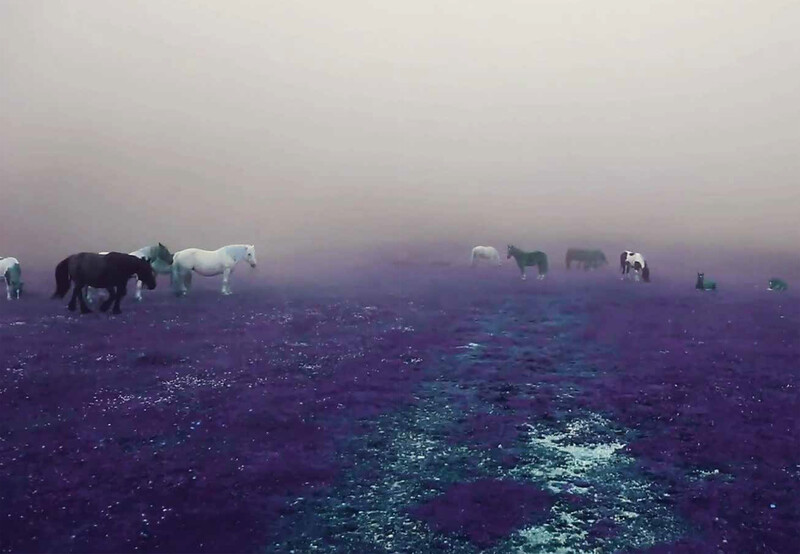
Exhibition Statement: Logics of Sense
Although the worlds we inhabit are invariably composed of sensations and sense-makings, it is a peculiar challenge to perceive ourselves sensing. Because our human-centred sensory habits are so difficult to discern, we can often mistake them for natural tendencies. As an attunement to the aesthetics of sensation, the exhibition Logics of Sense—presented in two parts at the Blackwood Gallery, University of Toronto Mississauga—examines sense-in-the-making, from the surface of incorporeal events to a multiplicity of decentralized perceptions, and from itinerant geo-methodologies to the various disciplinary frames and frameworks that artistic intelligence retrofits for emergent social and political realities.
Logics of Sense 1: Investigations (September 4 – October 19, 2019) includes works from Ursula Biemann, Mikhail Karikis, Susan Schuppli, and Jol Thomson; their respective videos and video essays address the interactions between land and the atmosphere, changing planetary dynamics, terrestrial micro-events, and the inheritance of knowledge. Moving through modes of prediction, observation, expression, perception, and re-configuration, visitors are invited to explore the becoming-sensuous of technoscience in formation.
Logics of Sense 2: Implications (October 28 – December 7, 2019) includes works by Revital Cohen & Tuur Van Balen, Barbara Marcel, Beatriz Santiago Muñoz, Miles Rufelds, and YangMing. Among their videos, sculptures, and screenings, visitors are implicated in both seeing like a state and sharing in ecological complicity through colonial pasts and capitalist futures. As geopolitical backstories unfold to reveal an entropic obsolescence of objects, a storm builds toward the moment of its explosive release.
How To Order
This publication is available for free download. To order any of our publications, please send an email including title(s), number of copies, and your mailing address to: blackwood.gallery[at]utoronto.ca.
Select solo exhibitions include Sounds of a Revolution, Calouste Gulbenkian Foundation, Portugal (2024); Songs for the Storm to Come, HOME Manchester, UK (2024); Because We Are Together, National Museum of Contemporary Art Athens (EMST), GR (2023); Acoustics of Resistance, Carpintarias de São Lázaro/Lisboa Soa, PT (2022); Ferocious Love, Tate Liverpool, UK (2020); Children of Unquiet, Fondazione Sandretto Re Rebaudengo, Torino, IT (2019); For Many Voices, Middlesbrough Institute of Modern Art, UK (2019-2020); I Hear You, De la Warr Pavilion, UK (2019-2020); Mikhail Karikis, Mori Art Museum, Tokyo, JP (2019); No Ordinary Protest, Whitechapel Gallery, London, UK (2018-2019). Karikis was shortlisted for the 2019 and the 2016 Film London Jarman Award, UK, and the 2015 Daiwa Art Prize, UK-JP. Select group exhibitions include: A Outra Vida Dos Animais, MNAC – National Museum of Contemporary Art, Lisbon, PT (2022); 5th Mardin Biennial, TR (2022); 2nd Riga Biennial, LV (2020); Kochi-Muziris Biennale 2016, IN; British Art Show 8, UK (2015-2017); Steirischer Herbst, AT (2015); 5th Thessaloniki Biennale, GR (2015); 19th Biennale of Sydney, AU (2014); Mediacity Seoul/SeMA Biennale, Seoul, KR (2014); Videonale 14, Kunstmusuem Bonn, DE (2013); 2nd Aichi Triennale, Nagoya, JP (2013); Manifesta 9, Ghenk, BE (2012); Danish Pavilion, 54th Venice Biennale, IT (2011).
- Curator
- Christine Shaw
Shaw’s work convenes, enables, and amplifies the transdisciplinary thinking necessary for understanding our current multi-scalar historical moment and co-creating the literacies, skills, and sensibilities required to adapt to the various socio-technical transformations of our contemporary society. She has applied her commitment to compositional strategies, epistemic disobedience, and social ecologies to multi-year curatorial projects including Take Care (2016–2019), an exhibition-led inquiry into care, exploring its heterogeneous and contested meanings, practices, and sites, as well as the political, economic, and technological forces currently shaping care; The Work of Wind: Air, Land, Sea (2015–2023), a variegated series of curatorial and editorial instantiations of the Beaufort Scale of Wind Force exploring the relentless legacies of colonialism and capital excess that undergird contemporary politics of sustainability and climate justice; and OPERA-19: An Assembly Sustaining Dreams of the Otherwise (2021–2029), a decentralized polyvocal drama in four acts taking up asymmetrical planetary crisis, differential citizenship, affective planetary attention disorder, and a strategic composition of worlds. She is the founding editor of The Society for the Diffusion of Useful Knowledge (Blackwood, 2018–ongoing), and co-editor of The Work of Wind: Land (Berlin: K. Verlag, 2018) and The Work of Wind: Sea (Berlin: K. Verlag, 2023).
Matthew Hoffman
Printing
Thistle Printing

Logics of Sense 1: Investigations
Micropublication produced on the occasion of Logics of Sense 1: Investigations, September 4 – October 19, 2019.
Featuring project descriptions, an introduction and exhibition text by Christine Shaw, artist biographies, and full colour illustrations throughout.
Free

The Blackwood
University of Toronto Mississauga
3359 Mississauga Road
Mississauga, ON L5L 1C6
[email protected]
(905) 828-3789
The galleries are open. Hours of operation: Monday–Saturday, 12–5pm.
Facebook | Twitter | Instagram
Sign up to receive our newsletter.
The Blackwood is situated on the Territory of the Mississaugas of the Credit, Seneca, and Huron-Wendat.